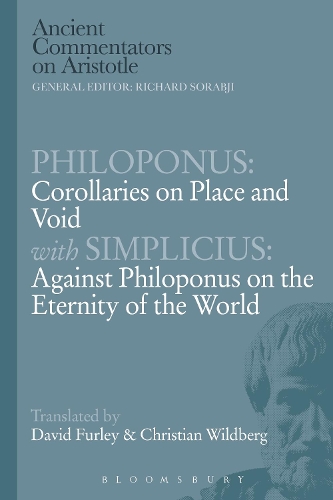
Philoponus: Corollaries on Place and Void with Simplicius: Against Philoponus on the Eternity of the World
(Paperback)
Available Formats
Paperback
Published: 26th March 2014
Hardback
Published: 1st November 2011
Paperback
Published: 26th March 2014
Paperback
Published: 26th March 2014
Paperback
Published: 26th March 2014
Paperback
Published: 26th March 2014
Paperback
Published: 26th March 2014
Paperback
Published: 26th March 2014
Paperback
Published: 26th March 2014
Paperback
Published: 26th March 2014
Paperback
Published: 26th March 2014
Paperback
Published: 26th March 2014
Paperback
Published: 26th March 2014
Paperback
Published: 26th March 2014
Paperback
Published: 10th April 2014
Hardback
Published: 1st April 2010
Publishing Details
Philoponus: Corollaries on Place and Void with Simplicius: Against Philoponus on the Eternity of the World
By (Author) Philoponus
Translated by C. Wildberg
Translated by W. D. Furley
Bloomsbury Publishing PLC
Bloomsbury Academic
10th April 2014
United Kingdom
Classifications
Tertiary Education
Non Fiction
Ancient Greek and Roman philosophy
Philosophy: metaphysics and ontology
185
Physical Properties
Paperback
156
Width 156mm, Height 234mm
227g
Description
In the Corollaries on Place and Void, Philoponus attacks Aristotle's conception of place as two-dimensional, adopting instead the view more familiar to us that it is three-dimensional, inert and conceivable as void. Philoponus' denial that velocity in the void would be infinite anticipated Galileo, as did his denial that speed of fall is proportionate to weight, which Galileo greatly developed. In the second document Simplicius attacks a lost treatise of Philoponus which argued for the Christians against the eternity of the world. He exploits Aristotle's concession that the world contains only finite power. Simplicius' presentation of Philoponus' arguments (which may well be tendentious), together with his replies, tell us a good deal about both Philosophers.
Author Bio
David Furley is Professor of Classics at Princeton University. Christian Wildberg is Lecturer in Greek at the Freie Universitt, Berlin
